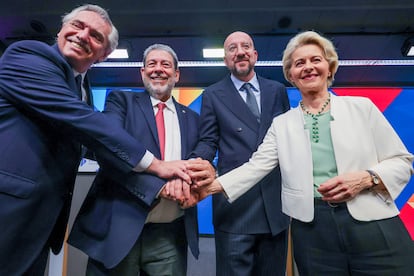A geopolitical summit
The EU-CELAC meeting raises hopes of closing Mercosur deal despite caution over Ukraine

The European Union (EU) had plenty of incentives to ensure the success of yesterday’s summit with CELAC (the Community of Latin American and Caribbean States), which began as an intergovernmental mechanism back in 1999. Since the last century, there has been a commitment for EU and CELAC leaders to meet every two years. However, these meetings have only materialized on two previous occasions. This past July 18 was seen as a recommitment to this partnership.
The war in Ukraine and the expansive force of China in Latin America have jump-started the EU’s new decisiveness on Central and South America. It’s incomprehensible for the EU — which purports to have a vocation for global leadership and claims to want strategic autonomy — to maintain an attitude of indifference to a group of countries that are, historically and culturally, so close to Europe. Many Latin American and Caribbean countries have similar values and political systems as European liberal democracies. Yet, due to insufficient attention from the EU, over the past two decades, China has surpassed the entire bloc’s trade relations with CELAC.
In the recent summit, the most important matter at hand was the trade agreement between the EU and Mercosur — the trade bloc consisting of Brazil, Argentina, Paraguay and Uruguay — which was reached four years ago, but has not yet entered into force, pending ratification. After 20 years of negotiations with successive leaders of Brazil, Argentina, Uruguay and Paraguay, its ratification was paralyzed with the 2018 election of climate denier Jair Bolsonaro to the presidency of Brazil. His administration clashed with the European Parliament, with countries such as France, the Netherlands, Ireland and Austria demanding greater commitment to the reforestation of the Amazon and the reduction of carbon emissions.
If the trade agreement comes into force by the end of this year — as President of the European Commission Ursula von der Leyen and Brazilian President Luiz Inácio Lula da Silva have optimistically expressed — it will be the largest-ever trade agreement with the EU by volume of trade. With this ratification, it will be possible for European nations to try to recover the commercial position that they have lost to China.
It makes perfect sense for the EU to also have an alternative to the New Silk Road (or Belt and Road Initiative) promoted from Beijing. European leaders are promising an investment package worth €45 billion ($51 billion) in Latin America, under the European Commission’s Global Gateway strategy. The sympathetic attitude that Putin’s war has found among some Latin American governments is explained by their desire to please President Xi Jinping — a supporter of the Russian leader and a major investor in Latin America — but also by the EU’s diplomatic neglect of South and Central America.
The unfortunate reflection of such negligence has been the conspicuous absence of President Volodymyr Zelenskiy at the recent summit. He had expressed his interest in addressing the meeting, but was blocked by the intransigence of the Nicaraguan government. Managua’s attitude has been starkly in favor of Putin, to the point of the regime’s representatives withdrawing the country’s signature from the summit’s tepid declaration, in which the rules-based international order is defended and concern about the war in Ukraine is expressed, with no explicit condemnation of the Russian invasion.
Beyond the immediate results of the summit — as well as the ambiguous final communiqué regarding Ukraine — the success of this meeting will be measured by its capacity for institutionalization and follow-up. Above all, there must be a change in the entire EU’s geopolitical attitude towards a group of countries that should count as close allies and partners in the international order that will emerge following the end of the war in Ukraine.
Sign up for our weekly newsletter to get more English-language news coverage from EL PAÍS USA Edition
Tu suscripción se está usando en otro dispositivo
¿Quieres añadir otro usuario a tu suscripción?
Si continúas leyendo en este dispositivo, no se podrá leer en el otro.
FlechaTu suscripción se está usando en otro dispositivo y solo puedes acceder a EL PAÍS desde un dispositivo a la vez.
Si quieres compartir tu cuenta, cambia tu suscripción a la modalidad Premium, así podrás añadir otro usuario. Cada uno accederá con su propia cuenta de email, lo que os permitirá personalizar vuestra experiencia en EL PAÍS.
¿Tienes una suscripción de empresa? Accede aquí para contratar más cuentas.
En el caso de no saber quién está usando tu cuenta, te recomendamos cambiar tu contraseña aquí.
Si decides continuar compartiendo tu cuenta, este mensaje se mostrará en tu dispositivo y en el de la otra persona que está usando tu cuenta de forma indefinida, afectando a tu experiencia de lectura. Puedes consultar aquí los términos y condiciones de la suscripción digital.









































